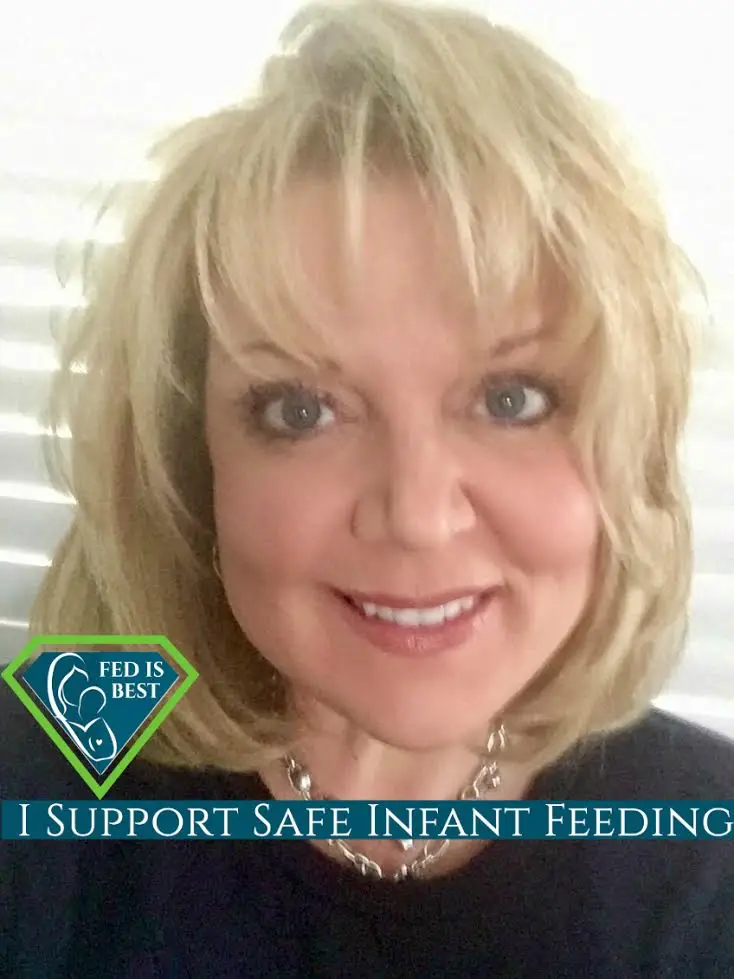Families are under enormous pressure to exclusively breastfeed from major health organizations such as the WHO, Baby-Friendly USA, CDC, AAP, ACOG, WIC offices, and the majority of US hospitals.
The “Breast is Best” public health campaign has permeated US culture and influenced hospital policies; even though US families face impossible barriers to breastfeeding exclusively, the pressure remains, and it is up to families to meet the unattainable guidelines for the majority of families.
By the way, there is no evidence that Baby-Friendly policies are effective for increasing long-term breastfeeding rates.
It has been shown in ample research that exclusively breastfeeding can cause serious complications for infants experiencing insufficient milk intake, a concern we discuss daily. The same pressure to exclusively breastfeed has now been linked to mental health complications, according to a recent research paper published in Research Psychiatry.
Breastfeeding pressure even has a pseudonym, “BRESSURE,” but it’s not funny.
What did the research find?
- Postpartum women felt that healthcare providers and the media put more pressure on them to breastfeed than their partners.
- Pressure from healthcare providers was associated with depressive, obsessive-compulsive, and eating disorder symptoms.
- Pressure from the media was associated with depressive and eating disorder symptoms.
- Above and beyond the other sources of pressure, pressure from healthcare providers explained a unique proportion of variance of obsessive-compulsive and eating disorder symptoms.
Why Are Healthcare Professionals pressuring families to breastfeed?
Baby-Friendly Hospital Policies promote exclusive breastfeeding and require healthcare providers, including physicians, nurses, midwives, and lactation consultants, to play key roles in communicating with patients about breastfeeding. Breastfeeding education begins early and continues throughout pregnancy, after delivery, and until they are discharged from the hospital. The goal? Exclusive breastfeeding. No other feeding methods are discussed; if a family decides to combo, formula, or pump feed, they are counseled on the “risks” of doing so.
This is just one example that was posted recently. From Baby Friendly USA:
If the mother decides on formula, what do we do then?
“Once the staff is satisfied that the mother understands all of the options and has weighed the potential risks associated with formula feeding, we honor the request,” Dr. Schreck says.
Seriously? (my emphasis)
Recently, a psychiatrist shared her breastfeeding experience in a Baby-Friendly Hospital and believed she was coerced into exclusively breastfeeding, stripping her of her confidence as a new mother. You can read her story here.
She writes: “Throughout my pregnancy, I was repeatedly asked if I would breastfeed and received endless lectures on the benefits. I was honestly skeptical about the claimed breastfeeding benefits… (liquid gold? seriously?), but continued to answer “yes,” as it felt like saying “no” would be the wrong answer.”
On the day of his birth, I imagined lying with him peacefully on my chest. But as the nurse repeatedly shoved my son’s face into my breast, causing him to scream and flail in protest, I realized that wasn’t going to happen. Nothing had prepared me for the chaos and stress I was experiencing.
My baby was unable to sustain a latch and breastfeed, and his hunger grew until he became more and more agitated. I only slept about 2 hours that first night as I listened to him cry and continued to try to nurse him because ‘breast is best.’ On my first morning as a new mother, I felt miserable and like a failure instead of elated and joyful.
As a psychiatrist, I have been a staunch advocate for women’s mental health, and I have treated women with high-risk mental health conditions during their pregnancies and beyond. After my birthing and breastfeeding experience, I am deeply concerned that women are being pressured and lied to at the most vulnerable time in their lives—a time when they need to feel empowered, not doubted, gaslighted, and coerced. -Dr. Michelle
According to the research paper, breastfeeding expectations have a significant impact on mothers’ mental health.
What studies did they cite in their paper?
- The pressure and judgment surrounding breastfeeding can be so powerful that some birthing parents report feeling guilt, shame, and embarrassment, in addition to believing they are “bad [parents]” if they do not breastfeed (Dykes, 2004; Sheehan et al., 2003).
- Failure to meet breastfeeding expectations is moderately associated with increased postpartum depression symptoms (Borra et al., 2015; Gregory et al., 2015; Pope and Mazmanian, 2016; Watkins et al., 2011).
- Breastfeeding difficulties are also linked to increased anxiety (Ystrom, 2012), obsessive-compulsive symptoms (Phillips et al., 2022), body dissatisfaction (Gjerdingen et al., 2009; Rodgers et al., 2018), and disordered eating behaviors (Brown, 2014; Rodgers et al., 2018) ranging from small to medium effect sizes.
- Postpartum parents have reported experiencing intrusive thoughts and obsessions about producing enough breastmilk (Phillips et al., 2022) and concerns over how breastfeeding changes the shape and appearance of their breasts, contributing to body dissatisfaction and eating disorder symptoms (Brown et al., 2011; Rodgers et al., 2022).
Parents are clearly suffering from mental health complications as a result of being pressured to breastfeed. Doctors, nurses, therapists, and lactation consultants have all written about the complications they experienced personally or professionally from the pressure and the expectation to breastfeed exclusively, with no regard to their mental health conditions.
Is everyone paying attention now? Do policymakers even care?
We have a maternal mental health crisis in the US.
- 1 in 5 Mothers are impacted by Mental Health Conditions, which are the MOST common complication of pregnancy and birth, affecting 800,000 families each year in the U.S
- Suicide and overdose are the LEADING CAUSES of death for women in the first year following pregnancy, accounting for approximately 225 deaths each year. With over 80 percent of these deaths preventable.
- There may be conflicting feelings among parents with mental health conditions when it comes to infant feeding, so it’s crucial to offer them choices that safeguard their mental health.
What do we know?
- If breastfeeding/chestfeeding goes well and is enjoyable, it can act as a protective factor against negative emotions.
- In situations in which breastfeeding expectations differ from actual lived experiences, parents are more likely to suffer from anxiety or depression.
- Having trouble making enough milk or not finding it satisfying or comfortable may make parents feel inadequate.
- The pressure to provide exclusive human milk may cause parents to feel stressed or anxious, even though they want to breastfeed.
- Parents may feel a range of emotions after weaning earlier than expected, from relief to grief or sadness.
- Some parents find formula feeding is both a positive experience and a protective measure of their mental health so that the baby can be fed by their partner while they get restorative sleep and other needs for the family.
- Some people provide human milk exclusively or partially by pumping to meet their needs to feed their babies.
The pressure to breastfeed exclusively must change. We do that every day here at the Fed Is Best Foundation by supporting breastfeeding without denigrating infant formula milk because it’s the ethical thing to do as health professionals.
We believe supporting bottle, combo, formula, pumping, tube feeding-feeding families, and infant formula itself is not anti-breastfeeding; it’s responsible, inclusive, and pro-safe infant feeding and pro-mental health for all families.
The time has come for Baby-Friendly USA to change its breastfeeding policies. There are lives at stake. In memory of Florence Leung
How the ‘exclusive-breastfeeding movement’ is impacting mother’s mental health (youtube.com)

Jody Segrave-Daly’s 32-year nursing career has been dedicated to caring for healthy and medically fragile babies in the nursery and NICU. When she began her community-based infant feeding practice 12 years ago, she was unprepared to see the significant numbers of babies suffering from accidental starvation complications. The stories she heard were the same —distressed mothers were being told never to supplement their crying, sleepy, jaundiced, and dehydrated babies — or risk ruining their breastfeeding relationship and milk supply. She has comforted countless mothers worldwide who believed it was rare to under-produce breast milk and often felt betrayed by their lactation and healthcare teams, their bodies, and the social pressure that insisted “Breast Is Best.” Now a staunch advocate for the Fed Is Best movement, Jody works to debunk those myths while supporting families to breastfeed, mix-feed, pump-milk-feed, formula-feed and tube-feed their babies. She uses evidence-based science and her years of clinical experience to support SAFE infant feeding. She also prioritizes perinatal mental health when counseling parents about their feeding options. Ultimately, every family has different needs and deserves individualized, unbiased, inclusive, and shame-free support. If you need help, please join our support group or contact her directly at jody@fedisbest.org
WE ARE EXCITED TO ANNOUNCE OUR UPCOMING BOOK!
It is now available for pre-order at all major retailers! Coming June 25, 2024!
Go to Fed is Best Book to pre-order today!
HOW YOU CAN SUPPORT FED IS BEST
There are many ways you can support the mission of the Fed is Best Foundation. Please consider contributing in the following ways:
- Send us your stories. Share with us your successes, your struggles, and everything in between. Every story saves another child from experiencing the same and teaches another mom how to feed her baby safely. Every voice contributes to change.
- If you need infant feeding support, we have a private support group– Join us here.
- If you or your baby were harmed from complications of insufficient breastfeeding, please send a message to contact@fedisbest.org
- Make a donation to the Fed is Best Foundation. We are using funds from donations to cover the cost of our website, our social media ads, and our printing and mailing costs to reach health providers and hospitals. We do not accept donations from breast- or formula-feeding companies, and 100% of your donations go toward these operational costs. All of the Foundation’s work is achieved via its supporters’ pro bono and volunteer work.
- Share the stories and the message of the Fed is Best Foundation through word-of-mouth, by posting on your social media page and by sending our FREE infant feeding educational resources to expectant moms you know. Share the Fed is Best campaign letter with everyone you know.
- Write a letter to your health providers and hospitals about the Fed is Best Foundation. Write to them about feeding complications your child may have experienced.
- Print out our letter to obstetric providers and mail it to your local obstetricians, midwives, and family practitioners who provide obstetric care and hospitals.
- Write your local elected officials about what is happening to newborn babies in hospitals and ask for the legal protection of newborn babies from underfeeding and for the mother’s rights to honest, informed consent on the risks of insufficient feeding of breastfed babies.
- Join us in any Fed is Best volunteer and advocacy groups. Click here to join our group of healthcare professionals. We have: FIBF Advocacy Group, Research Group, Volunteer Group, Editing Group, Social Media Group, Legal Group, Marketing Group, Perinatal Mental Health Advocacy Group, Private Infant Feeding Support Group, Global Advocacy Group, and Fundraising Group. Please email Jody@fedisbest.org if you want to join any of our volunteer groups.
- Send us messages of support. We work every single day to make infant feeding safe and supportive of every mother and child. Your messages of support keep us all going.
Additional Resources:
